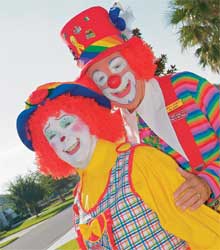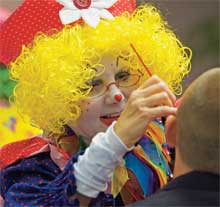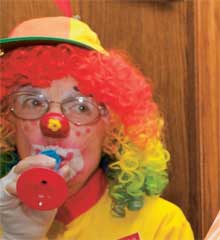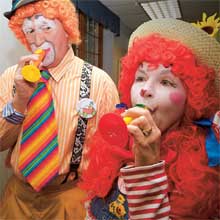



By Karin Fabry • Photos By Kent Weakley
If laughter is indeed the best medicine, then Archie and Jean Ernst still have a long life ahead of them. A pharmacist and real estate broker in their previous lives, today Archie and Jean have traded in their business suits for mismatched accessories and oversized pants.
“Archie was reading the newspaper and came across an ad for people interested in becoming a clown,” Jean recalls.
“I thought it might be fun to be a clown,” Archie adds.
So what did they do next? What any aspiring clown would do! They signed up for a six-week clown college course. There, Archie and Jean learned the finer points of face painting, creating balloon animals, and skit writing.
“One of the most important things we learned in class was how to apply our makeup,” Jean says. “That’s also where we decided what kind of clown we wanted to be and what our clown name would be.
“I knew from the beginning that I wanted to be a white-faced clown,” Jean continues.
Archie on the other hand, opted to transform himself into a classic Auguste clown.
“Learning how to put makeup on myself was never something I thought I’d do,” Archie laughs. “I’ve got the hang out of it now, though. I first draw a white line to create a muzzle around my mouth, and then I fill it in with white. Of course, as an Auguste clown, the base of my face isn’t white, it’s more of a cheerful pink hue and my mouth and eyes are outlined in a thin black line.”
But it doesn’t end there. Clown makeup is hard work! Jean admits that her clown makeup routine takes far longer to apply than her everyday makeup.
“There are plenty of steps for both of us,” she says. “After my white base coat, I exaggerate my eyebrows and eyes. I also added a glittery heart to the tip of my nose. That’s become my trademark.”
After the layers of thick black mascara, a light coating of powder keeps everything in place.
Archie laughs when he talks about “putting on his face.”
“Everyone has his or her own way to do it,” he says. “There is no wrong way to apply clown makeup. Instead, you just improvise if you mess up. When I get in front of the mirror, a metamorphosis takes place.”
“Yeah,” Jean chimes in “He starts to sing and dance.”
A Clown is Born
Once the makeup is on, Jean and Archie become Cuddles and Oopsy, respectively. While Jean wanted a “C” name to go with Clown (her last name, of course), Archie wanted a name that he could use in his act. As a clown magician, when an act doesn’t go quite as planned, Archie just shrugs his shoulders and says “oopsy” with a raise in his voice.
Now, with the names and the makeup complete, their everyday shorts and shirts just won’t do. They’re halfway to clownhood.
The final transformation is the colorful attire that completes the Ernsts’ clown personas. Like many hobbies, clowning can be expensive. To save on costs, Jean has tapped into her creative side, making many of their costumes from scratch.
“Goodwill is a great place to find items of clothing we can work with,” Jean says. “I find a lot of colorful golf pants for Archie there. I then clown them up with decorations.”
Jean also has a collection of hundreds of sewing patterns for a variety of clown costumes. Of course, some items — like socks, wigs, hats, and shoes — are purchased from special manufacturers. You can’t just go to JCPenney and buy floppy, oversized, red shoes, you know! Imagine paying more than $200 for a pair of shoes that you just know will only go with one outfit.
“While the shoes are expensive, they’re extremely comfortable,” Jean says. “The designers mark your feet and take plenty of measurements to get the size just right. So, although they look big and obnoxious, they’re probably one of my more comfortable pairs of shoes.”
Clownin’ Around
As members of The Villages Clown Alley 179, the Ernsts are very active in the organization. This is Jean’s first year as president after serving as secretary and vice president in recent years.
“There are about 100 clowns in the Alley and we’re always busy,” she says. “We’re very involved with local parades, club functions, and visiting nursing homes and schools.”
Both Jean and Archie agree that the most rewarding aspect of clowning is the involvement with the community.
“Sometimes, at nursing homes, the patients seem like they’re in another world,” Archie says. “Then when they see us come in, they come alive. We do the chicken dance for them and some do it right along with us from their wheelchairs.”
While the Ernsts acknowledge that they’re the same age (sometimes older) as many of the nursing home residents, Jean says being a clown keeps her and her husband young and vibrant.
“The laughter, camaraderie, and constant activity keep us going,” she says. “Our organization is very close. We all have very different personalities, but we fit together well.”
“We call each other by our clown names even when we’re not being clowns,” Archie adds with a smile. “It’s hilarious when we’re out in public. You should see some of the strange looks we get. Even my non-clown neighbor has taken to calling me Oopsy.”
The Art of Entertaining
Like any good clown, Jean and Archie’s main goal is to make someone smile. While Jean took an interest in face painting, Archie chose props as his clown specialty.
“I kind of went overboard,” he says. “I make a lot of my own items, including a wagon that shoots bubbles out the back.”
Archie also ordered a miniature clown bike that he often rides in parades. I admit, I’d like to see six-foot tall Archie ride the 2 1/2-foot tall bike.
“I had to alter it a bit,” he says. “I raised the handle bars and added a bigger seat so I wouldn’t fall off.”
Archie admits that he was forewarned about going into props.
“Veteran clowns warned me that I would end up with a house full of stuff. I always denied that would happen, but I quickly realized that you see things wherever you go and think what a great clown gadget it would make. Now I have an attic and a garage filled with oversized, colorful items. I admit, it can get kind of overwhelming.”
But they enjoy every minute of it. And so do the Ernsts’ daughters and grandchildren.
“Our oldest daughter was with a friend recently and she commented that her parents were clowns. Her friend said, ‘I know what you mean. My parents are clowns, too.’ Our daughter laughed and said, ‘No, my parents really are clowns.’”
That’s what it’s all about. Making people laugh. To be a successful clown, you have to genuinely like people.
“You have to have a sense of humor and project that humor to other people,” Archie says.
“I never imagined I’d be a clown,” Jean adds. “It’s incredibly rewarding to be able to put on a costume and some makeup and really make someone’s day. I’m just sorry we didn’t become clowns earlier.”






